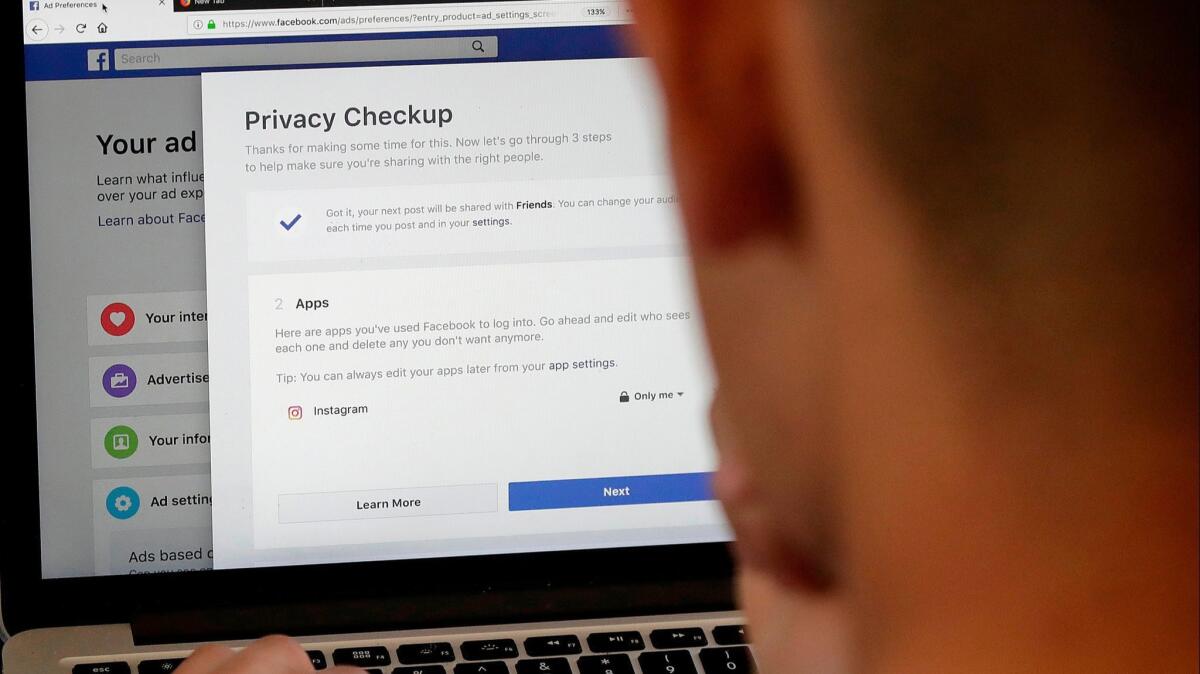Editorial: With the federal government missing in action, California should set its own rules for internet privacy

With the federal government moving backward on privacy protections, California is looking at two competing ways to impose its own, groundbreaking rules for the collection of personal information online. The more far-reaching proposal is the California Consumer Privacy Act, a ballot measure that would amend the state Constitution to require websites and services to give California residents more control over the data collected about them online. But under a deal struck by its lead sponsor, the measure will be withdrawn from the November ballot if the state Legislature passes and Gov. Jerry Brown signs a similar but more limited proposal, AB 375, by Thursday afternoon.
It’s a close call, but all in all, AB 375 is the better way to go.
The federal government really should be the one establishing privacy rights online. Congress has shown no interest in doing so, however — in fact, it repealed the Federal Communication Commission’s online privacy rules last year. And the Federal Trade Commission can do little more than force websites to honor whatever commitments they make in their terms of service. That’s not much help, considering how few consumers bother to read the long and deliberately opaque terms set by most sites.
Meanwhile, personal information has become the fuel powering much of the internet, even as internet users remain largely in the dark about how their information is being used. That’s a problem, given that much of what’s offered and shown to you online is shaped by what companies glean about your life, your predilections and your finances from the digital bread crumbs you scatter as you use the internet. Such data could conceivably be used, for instance, by private investigators to trace where you go and whom you see, or by payday lenders to determine who might be desperate for an infusion of cash.
Enter the Fray: First takes on the news of the minute from L.A. Times Opinion »
Both AB 375 and the ballot measure would give California internet users the rights to know what personal information is being collected about them online, to delete it if they wish, to find out whether it’s being sold to anyone, and to opt out of such sales. The ballot measure would also bar companies from withholding or downgrading services when individuals refuse to share their data. The bill is more nuanced on that point, allowing companies to offer better services under certain circumstances to consumers who agree to share their data.
The ballot measure’s main advantage is in enforcement: It would give consumers the right to sue when companies misuse their data, while AB 375 would confine that power to the state attorney general. But it will be far easier for policymakers to adjust AB 375 to fast-evolving internet business models than it would be to tweak the constitutional changes wrought by the ballot measure.
Beyond that, the ballot measure faces considerable opposition from deep-pocketed internet and telecommunications companies. Lawmakers would be wise to support the bird in hand, AB 375, which poses no risk of flying off in November.
Follow the Opinion section on Twitter @latimesopinion and Facebook.
More to Read
A cure for the common opinion
Get thought-provoking perspectives with our weekly newsletter.
You may occasionally receive promotional content from the Los Angeles Times.






